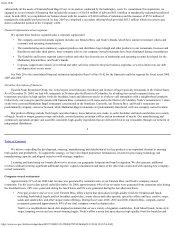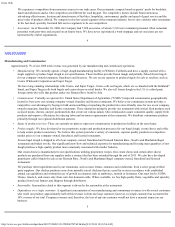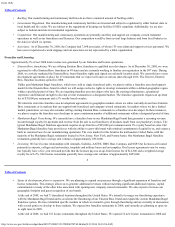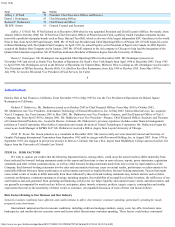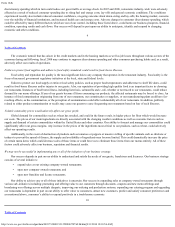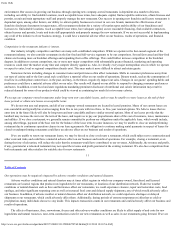Einstein Bros 2008 Annual Report Download - page 13
Download and view the complete annual report
Please find page 13 of the 2008 Einstein Bros annual report below. You can navigate through the pages in the report by either clicking on the pages listed below, or by using the keyword search tool below to find specific information within the annual report.
Form 10-K
http://www.sec.gov/Archives/edgar/data/949373/000119312509042707/d10k.htm[9/11/2014 10:10:56 AM]
Table of Contents
Our restaurants and products are subject to numerous and changing government regulations. Failure to comply could negatively affect our sales,
increase our costs or result in fines or other penalties against us.
Each of our restaurants is subject to licensing and regulation by the health, sanitation, safety, labor, building and fire agencies of the
respective states, counties, cities and municipalities in which it is located. A failure to comply with one or more regulations could result in the
imposition of sanctions, including the closing of facilities for an indeterminate period of time, or third party litigation, any of which could have a
material adverse effect on us and our results of operations.
Recently, many government bodies have begun to legislate or regulate high-fat and high sodium foods and disclosure of nutritional
information as a way of combating concerns about obesity and health. In addition to the phase-out of artificial trans-fats, public interest groups
have focused attention on the marketing of high-fat and high-sodium foods to children in a stated effort to combat childhood obesity. Some cities
and states have recently adopted or are considering regulations requiring disclosure of nutritional facts, including calorie information, on menus
and/or menu boards. Additional cities or states may propose or adopt similar regulations. The cost of complying with these regulations could
increase our expenses and the possible negative publicity arising from such legislative initiatives could reduce our future sales.
Our franchising operations are subject to regulation by the Federal Trade Commission. We must also comply with state franchising laws and
a wide range of other state and local rules and regulations applicable to our business. The failure to comply with federal, state and local rules and
regulations would have an adverse effect on us.
Under various federal, state and local laws, an owner or operator of real estate may be liable for the costs of removal or remediation of
certain hazardous or toxic substances on or in such property. Such liability may be imposed without regard to whether the owner or operator knew
of, or was responsible for, the presence of such hazardous or toxic substances. Although we are not aware of any environmental conditions that
require remediation by us under federal, state or local law at our properties, we have not conducted a comprehensive environmental review of our
properties or operations. We may not have identified all of the potential environmental liabilities at our properties, and any such liabilities that are
identified in the future may have a material adverse effect on our financial condition.
We may not be able to protect our trademarks, service marks and other proprietary rights.
We believe our trademarks, service marks and other proprietary rights are important to our success and our competitive position.
Accordingly, we devote substantial resources to the establishment and protection of our trademarks, service marks and proprietary rights. However,
the actions we take may be inadequate to prevent imitation of our products and concepts by others, to prevent various challenges to our
registrations or applications or denials of applications for the registration of trademarks, service marks and proprietary rights in the U.S. or other
countries, or to prevent others from claiming violations of their trademarks and proprietary marks. In addition, others may assert rights in our
trademarks, service marks and other proprietary rights.
Our ability to use net operating loss carryforwards to offset future taxable income for U.S. federal income tax purposes is subject to limitation.
In general, under Section 382 of the Internal Revenue Code, a corporation that undergoes an “ownership change” is subject to limitations on
its ability to utilize its pre-change net operating loss (“NOL”) carryforwards to offset future taxable income. A corporation generally undergoes an
“ownership change” when the stock ownership percentage (by value) of its “5 percent stockholders” increases by more than 50 percentage points
over any three-year testing period.
As of December 30, 2008, our NOL carryforwards for U.S. federal income tax purposes were approximately $135.4 million. As a result of
prior ownership changes, approximately $29.8 million of our NOL carryforwards
15
Table of Contents
are subject to an annual usage limitation of $2.5 million. Due to transactions involving the sale or other transfer of our stock from the date of our
last ownership change through the date of the secondary public offering of our common stock, and changes in the value of our stock during that
period, such offering may result in an additional ownership change for purposes of Section 382 or will significantly increase the likelihood that we
will undergo an additional ownership change in the future (which could occur as a result of transactions involving our stock that are outside of our
control). In either event, the occurrence of an additional ownership change would limit our ability to utilize the approximately $105.6 million of
our NOL carryforwards that are not currently subject to limitation, and could further limit our ability to utilize our remaining NOL carryforwards
and possibly other tax attributes. Limitations imposed on our ability to use NOL carryforwards and other tax attributes to offset future taxable
income could cause us to pay U.S. federal income taxes earlier than we otherwise would if such limitations were not in effect, and could cause
such NOL carryforwards and other tax attributes to expire unused, in each case reducing or eliminating the benefit of such NOL carryforwards and
other tax attributes to us and adversely affecting our future cash flow. We filed a request with the Internal Revenue Service to review our


